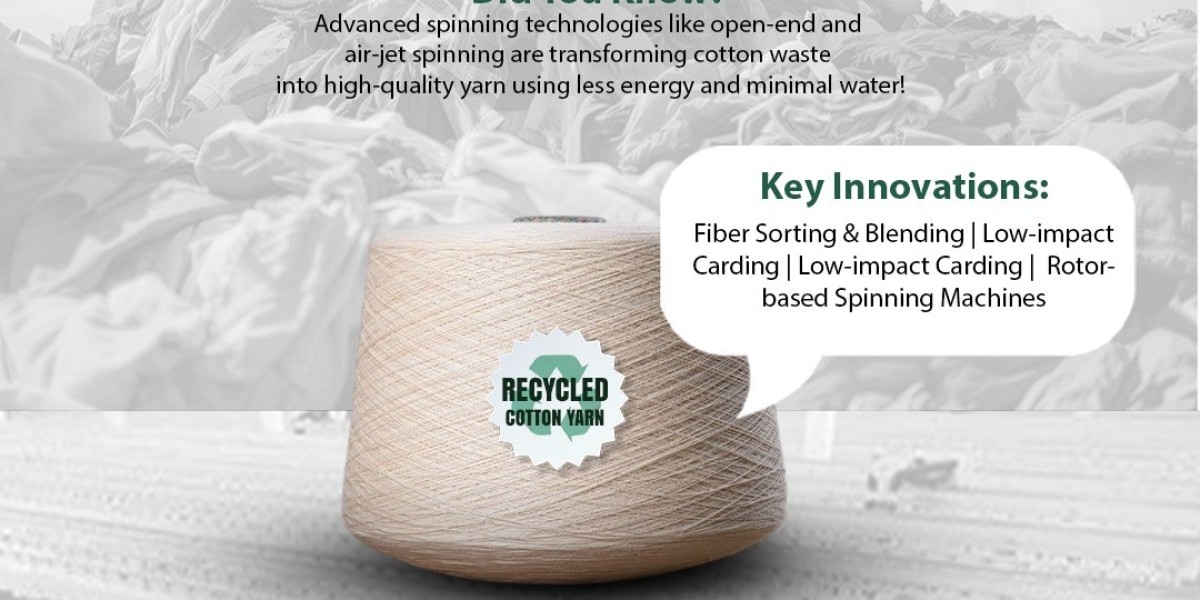The textile industry has always been at the heart of human civilization, providing clothing, comfort, and creativity. But over the last few decades, it has also become one of the world’s most resource-intensive and polluting sectors. From excessive water consumption to chemical waste and discarded fabrics, the environmental cost of fashion is undeniable.
This is where Recycled Yarn emerges as a game-changing solution. Instead of relying only on virgin fibers, recycled yarn transforms textile waste, PET bottles, and discarded materials into new fibers — reducing environmental damage while promoting circularity. With the growing focus on eco-friendly production, recycled yarn manufacturers and suppliers are shaping the future of sustainable textiles.
What is Recycled Yarn?
Recycled yarn is produced from pre-consumer waste (such as factory cuttings) and post-consumer waste (like discarded garments or plastic bottles). This process involves collecting, sorting, cleaning, shredding, and spinning waste into usable yarns without needing entirely new raw materials.
The result is a strong, versatile, and sustainable yarn that can be used in clothing, upholstery, accessories, and industrial textiles. Unlike virgin yarn, recycled yarn significantly reduces water, energy, and chemical usage.
Why Recycled Yarn Matters
Environmental Conservation
Traditional textile production consumes enormous resources. For example, producing 1 kg of cotton yarn requires around 10,000 liters of water. By contrast, recycled yarn reduces water dependency by reusing existing fibers.
It also helps keep millions of tons of textile waste out of landfills and oceans.
Energy Efficiency
Recycled fibers require less energy to produce compared to virgin fibers. By minimizing the need for raw material extraction and chemical treatment, recycled yarn reduces carbon emissions.
Promoting Circular Economy
Instead of following a "take-make-dispose" model, recycled yarn supports a closed-loop cycle where waste materials re-enter the production chain, extending their lifespan and reducing resource dependency.
Benefits for Businesses and Consumers
For Manufacturers: Cost savings on raw materials, access to eco-conscious markets, and compliance with international sustainability standards.
For Consumers: Affordable, durable, and stylish clothing that aligns with sustainable living.
For the Planet: Reduced landfill waste, lower carbon footprint, and preservation of natural resources.
It’s a win-win for all stakeholders.
The Role of Recycled Yarn Manufacturers
Recycled Yarn Manufacturers are at the forefront of the textile revolution. By investing in advanced machinery and eco-friendly production processes, they are not only reducing waste but also ensuring consistent quality in yarn output. Many leading manufacturers are also collaborating with global fashion brands to provide sustainable raw materials for large-scale production.
Key contributions of manufacturers include:
Developing innovative blends of cotton, polyester, and wool from recycled sources.
Ensuring compliance with global certifications like GRS (Global Recycled Standard).
Promoting transparency in the supply chain to build trust with buyers.
How Recycled Yarn Suppliers Add Value
While manufacturers focus on production, Recycled Yarn Suppliers ensure global accessibility. They connect industries, designers, and businesses with sustainable yarns at scale. Suppliers play a vital role in:
Creating reliable distribution networks.
Offering a variety of yarns suitable for different applications (fashion, home textiles, industrial uses).
Supporting SMEs and local businesses with sustainable raw materials.
By bridging the gap between manufacturers and buyers, suppliers accelerate the adoption of recycled yarn worldwide.
Applications of Recycled Yarn
Recycled yarn is not limited to eco-conscious clothing brands. Its applications are wide-ranging:
Fashion & Apparel – T-shirts, dresses, denim, and jackets made with recycled cotton or polyester.
Home Textiles – Rugs, curtains, upholstery, and bedsheets.
Industrial Use – Ropes, car seat fabrics, geotextiles, and packaging.
Accessories & Crafts – Bags, shoes, and even DIY knitting projects.
This versatility makes recycled yarn a practical choice across industries.
Challenges in Recycled Yarn Production
Despite its benefits, recycled yarn production faces certain hurdles:
Quality Consistency: Virgin fibers often outperform recycled fibers in terms of uniformity.
Sorting & Collection: Gathering waste materials efficiently remains a logistical challenge.
Consumer Awareness: Many buyers are still unaware of the benefits of recycled yarn, slowing down adoption.
However, with advancing technology and growing demand for eco-friendly fashion, these challenges are steadily being addressed.
Why Recycled Yarn is the Future of Sustainable Textiles
Global Push for Sustainability – Governments and fashion giants are adopting eco-friendly policies and mandating the use of recycled materials.
Technological Advancements – Automated sorting, advanced spinning, and chemical recycling methods are making recycled yarn more efficient and higher quality.
Consumer Awareness – Millennials and Gen Z buyers prefer sustainable fashion, creating a strong market for recycled yarn products.
Brand Collaboration – Luxury brands and fast fashion companies alike are committing to increasing their share of recycled fibers in production.
This convergence of environmental responsibility, technology, and consumer demand ensures that recycled yarn will dominate the textile industry in the coming years.
Conclusion
Recycled yarn is no longer a niche product — it is a necessity for the future of textiles. By reducing waste, saving water, and lowering carbon emissions, it addresses some of the biggest challenges facing the industry today. With recycled yarn manufacturers innovating production processes and recycled yarn suppliers expanding global reach, the path to a circular, sustainable textile future is clearer than ever.
The fashion and textile industries are undergoing a transformation, and recycled yarn is at the heart of it. The time has come for businesses and consumers alike to embrace this eco-friendly alternative and contribute to a greener tomorrow.






